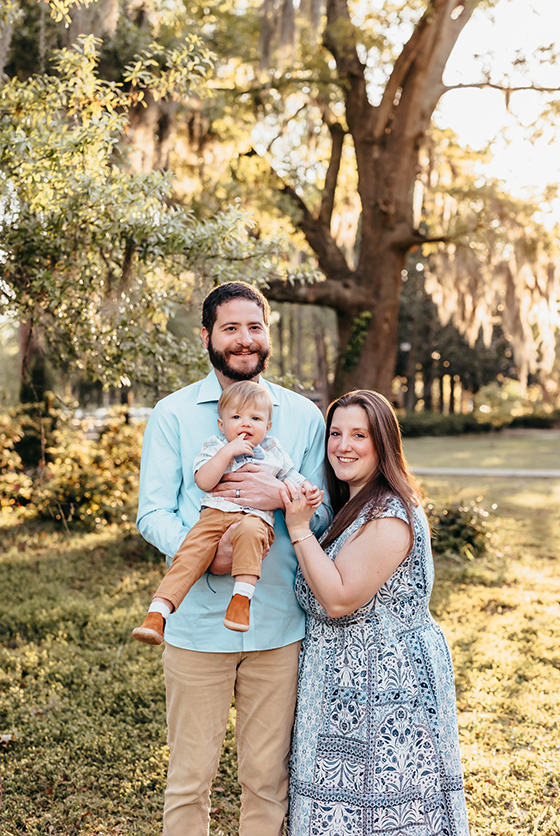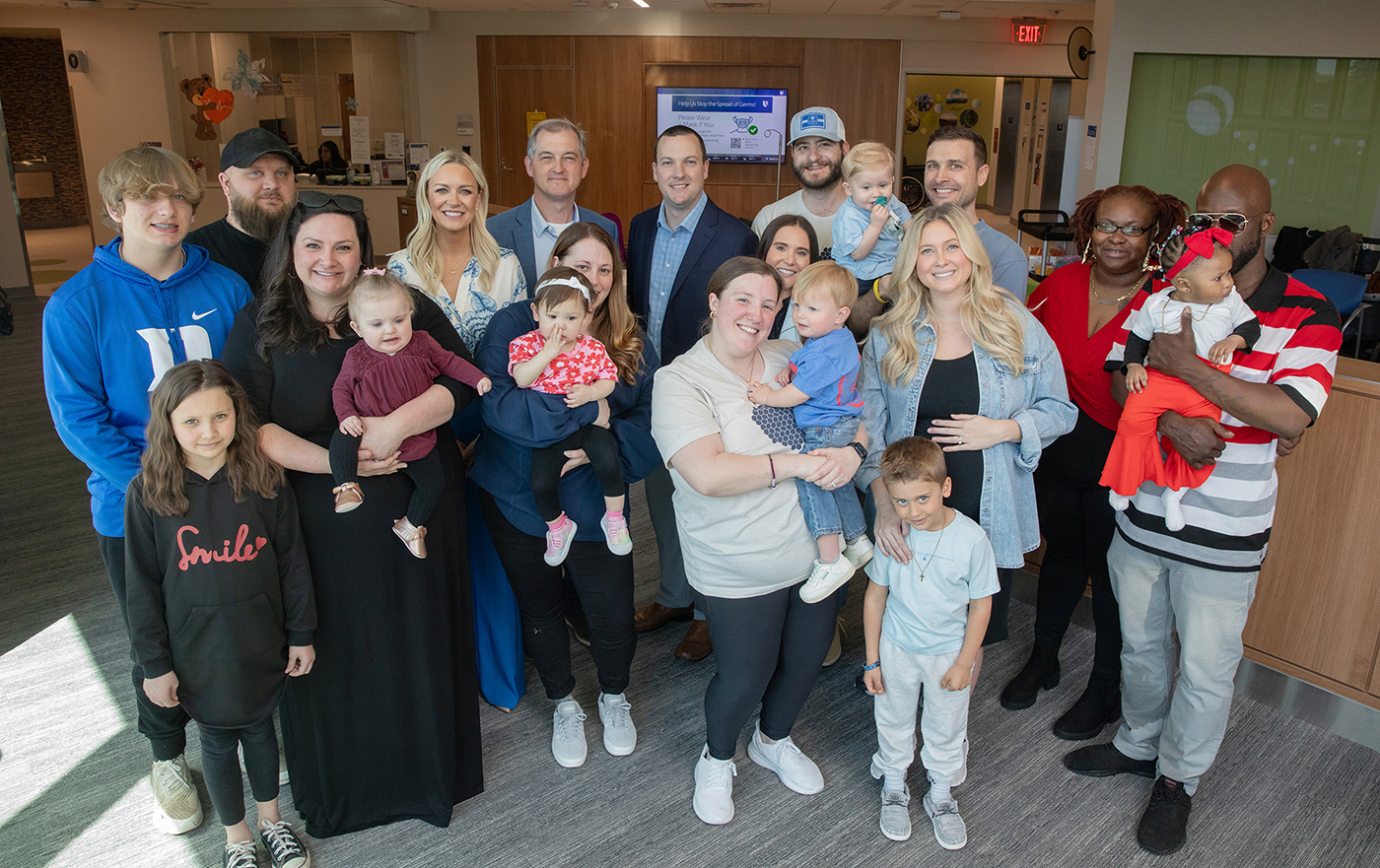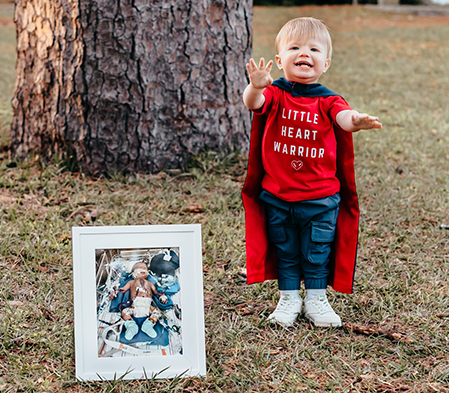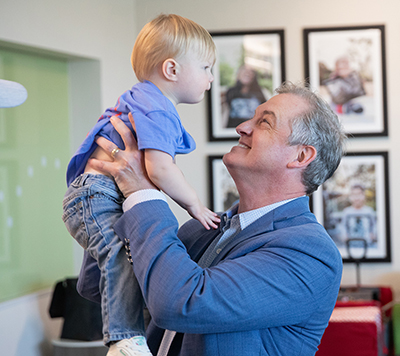Big Little Hearts
Toddlers thrive several years after pioneering heart procedures
With contributions from Morgan deBlecourt, Lindsay Gordon-Faranda, and Mary-Russell Roberson
Photography by SavBrown Photography courtesy of the Monroe family and Shawn Rocco for Duke Health
Published as part of the Summer 2024 issue of Duke Children's Stories
When parents are confronted with complex cardiology diagnoses, they know that the Duke Children’s Pediatric and Congenital Heart Center will provide hope and healing that many other pediatric centers cannot. The center was ranked #2 in the nation and #1 in North Carolina for cardiac care and surgery in the 2022-2023 U.S. News and World Report rankings, partially due to several milestone procedures that were done for the first time in the world at Duke Children’s.
For every first-ever procedure pioneered by a physician or researcher, there is a family willing to undertake that journey. The bravery exhibited by families whose children are in this unique club of “First Evers” cannot be overstated. Now, these families are experiencing bright futures with their children — futures that were once unimaginable.
A LEAP OF FAITH
Owen Monroe was 17 days old when he became the world’s first partial heart transplant recipient. The revolutionary surgery was performed in April 2022 by Duke pediatric heart surgeons at Duke University Hospital. Two years later, Owen continues to reap the benefits. A study published in January 2024 in the Journal of the American Medical Association shows that Owen’s valves and arteries are functioning well and growing as expected. As a result, he will need fewer surgeries and less immunosuppressant medications over his lifetime.
While she was pregnant, Tayler Monroe and her husband, Nick, learned that Owen had a rare congenital heart defect called truncus arteriosus: two of his major heart arteries fused into a single vessel that had a leaky valve. When he was born, he was put on the list for a heart transplant but wasn’t expected to survive the months-long wait for one. Pediatric heart surgeon Joseph Turek, MD, PhD, MBA, knew Owen didn’t really need a whole new heart; he just needed new arteries and valves. However, transplanting only the arteries and valves hadn’t been done before.
Turek had already conceived of a partial heart transplant and made it a focus of his research. One of the motivations behind the procedure is that many hearts available for donation aren’t strong enough to be used but have perfectly good valves. Another benefit is that valves from a donor heart would grow along with a child, eliminating the current need for children with faulty valves to have repeated surgical implantation of cadaver valves, which don’t grow.
Owen’s outlook for survival was so dire that his parents decided to go ahead with the new operation. “It was the right time, the right patient, and the right family that put their faith in us to do this,” Turek said. “All the stars aligned.”
“I still don’t think I have comprehended the magnitude of the medical and technological advances that [Owen] represents,” said Nick Monroe.

Earlier this year, several families with babies who had undergone partial heart transplants at Duke united for a day of celebration. They were joined by members of the Duke Pediatric and Congenital Heart Center and by representatives of the Brett Boyer Foundation, which provides funding that supports clinical care and research into congenital heart defects.

THE DOMINO EFFECT
The partial heart transplant not only saved Owen’s life; it also made history by using functional parts of a heart that would have otherwise been discarded. As of April 2024, 13 children have received partial heart transplants. Nine of these have happened at Duke and four at other medical centers with guidance from Turek.
Partial heart transplants open new opportunities in several other ways. In one scenario, called “split root,” two valves from one donor heart can go to two different children who need only one.
Another opportunity is the ability to perform “domino” transplants, in which a child who receives a new heart donates their own valves to a second baby.
Kaylee Cooper and Drew Hobby became concerned when their newborn son, Asher, stopped eating normally. Local doctors discovered Asher’s heart muscle was damaged beyond repair. Cooper and Hobby, who live in Greensboro, North Carolina, brought Asher to Duke, where he was hospitalized and placed on the national heart transplant waitlist.
In June of 2023, when Asher was three months old, his parents learned that Asher had been matched with a donor heart. The opportunity came with a chance to help another child with heart disease, one who needed new heart valves. Although Asher’s heart muscle was damaged, his heart valves were healthy. “When we were asked if we would like for Asher’s heart valves to be donated, we immediately said ‘yes, of course we would!’” Cooper said.
First, Asher’s heart was removed and replaced with the donor heart. Then, instead of discarding Asher’s old heart, surgeons harvested its healthy valves and arteries and transplanted them into the other child at Duke the next day. The two babies were part of the first domino heart transplant in North Carolina. Both children are growing and meeting important developmental milestones.
“A part of his very, very damaged heart still went to help another kid,” said Hobby. “That was...one of the most amazing things.”
“Twenty percent of infants waiting for a heart transplant won’t get one,” said Turek. “Finding a way to double the number of patients who can receive the gift of organ donation is going to help so many children who may have otherwise died waiting on a heart transplant.”
GRATITUDE, FROM HEART TO HEART 
While these pioneering procedures often make headlines, the all-encompassing care that these young patients and their families receive often happens behind the scenes. A host of individuals work tirelessly to care for every patient at Duke and to ensure that their families feel supported, educated, and empowered to make the best decisions for their children.
Tayler Monroe, Owen’s mother, is effusive in her praise of the team at Duke’s pediatric heart center, saying that every employee treated her family with compassion, kindness, respect, and love: the nurses who bonded with Owen, the respiratory therapists who were always available for support, the transplant coordinator who was with them through the whole process, and the Child Life specialists who ensured the family had breaks and met other heart families. She also has gratitude for the non-medical team members who offered small gestures to brighten their days: the dietary staff who would send up an extra slice of pizza, the environmental services personnel who would make small talk while cleaning Owen’s room, and the hospital chaplin who would stop by daily to offer support and prayer.
“Every single person not only made a difference in our son’s life but made a huge impact on our lives,” adds Monroe. “We think of Pediatric Cardiac ICU as our home away from home, filled with extended family members whom we love and adore and trust. Not only did the team save Owen’s life, but they gave us hope and a future with our son, and for that, we are eternally grateful.”
At just over two years old, Owen is a medical miracle. The transplanted parts of his heart are growing with his own heart. He is only taking two medications. He is active and loves to run, climb, and play wrestle. He has a long and bright life ahead of him — a gift that was never a certainty.
“I just know he’s here for a purpose, and he’s gonna change the world, he already has,” says Monroe. “We’re just kind of here to steer him in the right direction.”

Owen Monroe, the world's first partial heart transplant recipient, shares a tender moment with Joe Turek, MD, PhD, MBA, who performed his surgery.
"Every single person not only made a difference in our son’s life but made a huge impact on our lives. We think of Pediatric Cardiac ICU as our home away from home, filled with extended family members whom we love and adore and trust. Not only did the team save Owen’s life, but they gave us hope and a future with our son, and for that, we are eternally grateful."
YOUR GIFT CREATES A BRIGHTER FUTURE FOR CHILDREN IN NEED
We appreciate gifts of any size, making sure that your generosity is used to advance medical care and provide a better tomorrow for our children. You can choose a dollar amount to give now, or continue exploring more ways that you can support Duke Children’s.